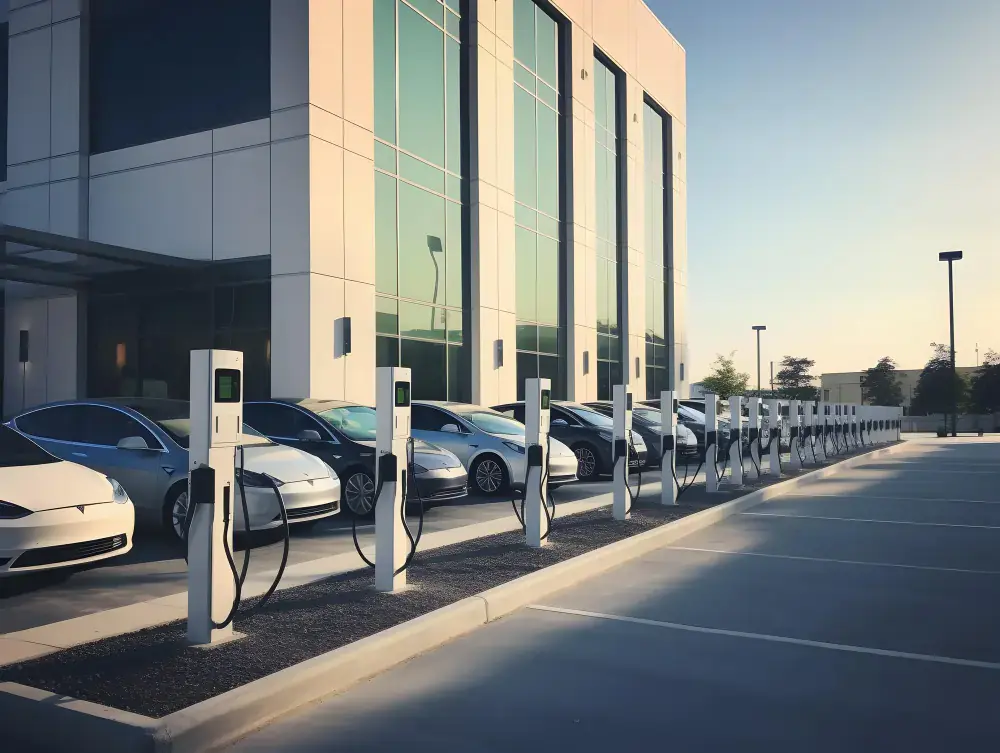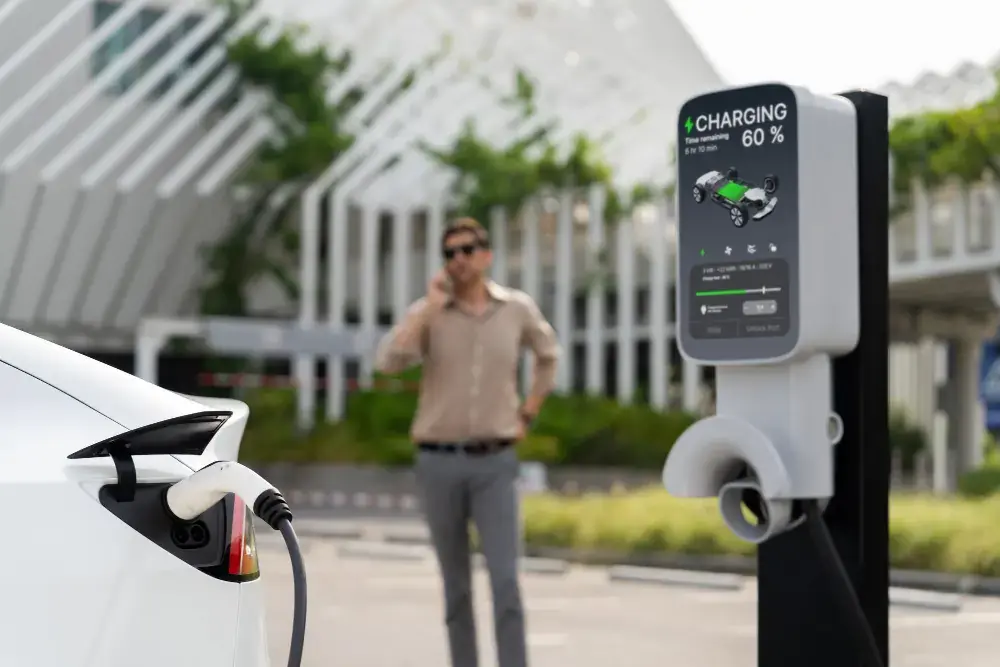The emergence of electric vehicles is transforming urban transport...


As the world moves towards sustainable lifestyles, incorporating battery-powered vehicles into our everyday routines has grown more significant. A vital aspect of this shift is the creation of EV charging stations, which significantly contribute to improving green real estate. This blog discusses the ways in which EV charging infrastructure promotes sustainable development.
The quick increase in the number of people using green vehicles happened because they are good for the environment, and more people understand climate change now. These cars, unlike fuel-powered ones, do not give out harmful gases from their exhausts. This helps make the air cleaner and lowers dangerous greenhouse gas levels a lot.
For this transformation to be effective, a robust network of charging stations is essential. With more individuals choosing these vehicles, the demand for convenient and accessible charging options grows. This shift greatly impacts real estate, as homes with EV charging stations become more attractive to potential buyers.
A direct effect of installing EV charging stations is the rise in property value. Residences and commercial properties equipped with charging facilities can achieve a price increase compared to similar properties lacking these features. This trend is especially notable in cities where inhabitants depend on public transit and electric vehicles for their everyday travel.
Additionally, as the number of people using electric vehicles increases, properties without charging facilities might experience a decline in value. Consumers are progressively seeing sustainable buildings with EV charging stations as vital investments that resonate with their environmentally conscious lifestyles.
Along with boosting property values, EV charging stations improve tenant retention and appeal. Businesses seeking to attract eco-friendly customers understand the significance of offering accessible charging solutions. Properties equipped with EV infrastructure can draw in tenants who value sustainability, resulting in extended lease durations and reduced vacancy rates.
For example, commercial real estate developers are more frequently including EV charging stations in their designs to draw in businesses aiming to improve their corporate image via sustainability efforts. Offering these amenities not only satisfies tenant needs but also positions properties as innovative and in tune with contemporary consumer values.
The incorporation of EV charging stations within real estate is a facet of a larger trend toward sustainable infrastructure. This idea includes multiple eco-friendly methods designed to lessen environmental effects while improving urban life quality. By setting up EV chargers, property owners aid in creating a network that promotes cleaner transport alternatives and lessens dependence on fossil fuels.
Moreover, numerous contemporary innovations are created with sustainability as a priority, integrating elements like solar panels and energy-efficient systems along with EV charging stations. This comprehensive strategy not only reduces carbon footprints but also fosters a healthier habitat for inhabitants.
The increase in electric vehicles requires modifications in urban planning and development approaches. Urban planners are progressively acknowledging the necessity for cohesive transportation strategies that encompass sufficient EV charging facilities. Modern residential and commercial projects frequently include designated areas for EV chargers, guaranteeing that future occupants can utilize this important service.
In addition, metropolitan regions are evolving into "smart cities," utilizing technology to enhance the quality of life. Real-time information on the availability of charging stations and their integration with renewable energy sources is increasingly becoming a standard topic in urban planning conversations. Many cities have established smart grids that enhance energy consumption according to the needs of residents and electric vehicles.
This development improves the overall effectiveness of transportation systems while encouraging eco-friendly living habits. As urban areas grow in population density, efficient public transport systems along with extensive access to EV chargers will be essential for mitigating congestion and pollution.
The convergence of electric vehicles and real estate has major economic consequences as well. Properties that feature EV charging stations experience higher demand and provide owners with new opportunities for revenue generation. Charging fees, subscription systems, and collaborations with charging network operators can generate consistent revenue streams for property owners.
Moreover, as governments across the globe enact measures to encourage electric vehicle uptake—like tax incentives or subsidies—properties that align with this movement are expected to receive extra financial assistance. For instance, certain municipalities provide grants or rebates to property owners who set up EV chargers on their premises.
Additionally, companies that offer access to EV chargers might be eligible for different sustainability certifications or recognition programs that improve their brand reputation and draw in eco-friendly customers.

Although there are many advantages linked to the incorporation of EV charging stations in real estate, obstacles persist. The upfront expenses tied to setting up this infrastructure can be substantial, especially for older structures that might need considerable electrical improvements. Moreover, challenges concerning grid capacity and uniform charging procedures need to be tackled to enable broad acceptance.
Cooperation between government organizations, utility firms, and private developers is crucial to tackling these challenges and establishing a robust network of EV chargers that satisfies increasing demand. Public-private collaborations can significantly contribute to financing these projects while guaranteeing fair access throughout various communities.
Additionally, informing property owners about the lasting advantages of investing in EV infrastructure is essential for promoting widespread adoption. Many might be reluctant because of perceived expenses or insufficient understanding of possible returns on investment.
As we progress toward a more sustainable future, the importance of EV charging stations in eco-friendly real estate is immense. These amenities not only raise property values but also draw environmentally aware tenants while promoting larger ecological objectives. By investing in eco-friendly buildings with charging facilities, property owners align themselves advantageously in a changing market that emphasizes green initiatives.
Incorporating electric vehicles into our transport networks marks an important advancement in lowering our carbon emissions and enhancing air quality. As cities keep expanding and changing, the significance of green infrastructure—including strong systems of EV chargers—will only grow. Welcoming this transformation will not only enhance individual properties but also help in creating healthier communities for future generations.
The emergence of electric vehicles is transforming urban transport...
Electric vehicles represent a defining change for the automotive industry...